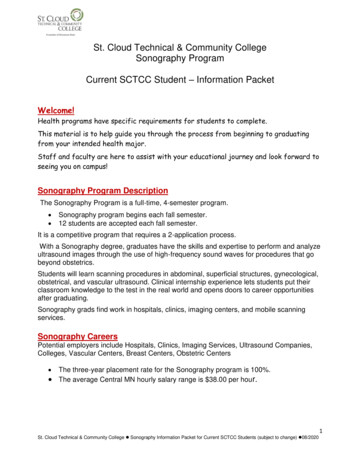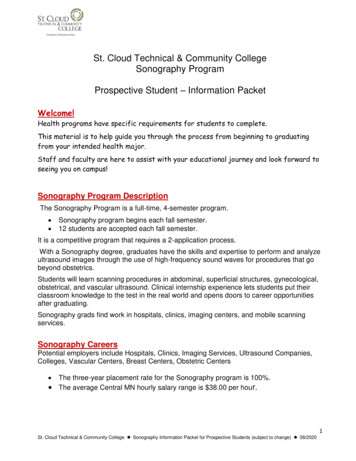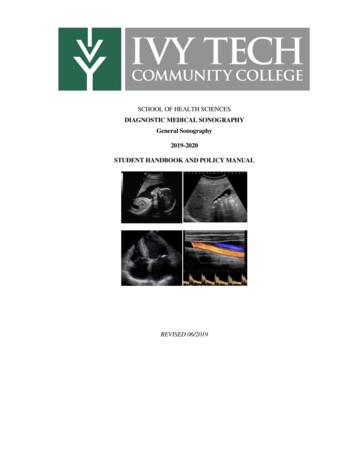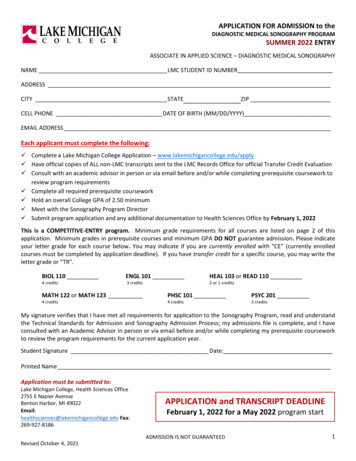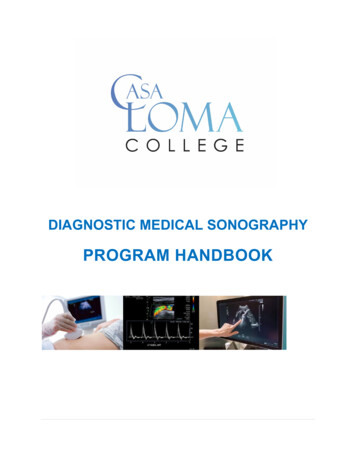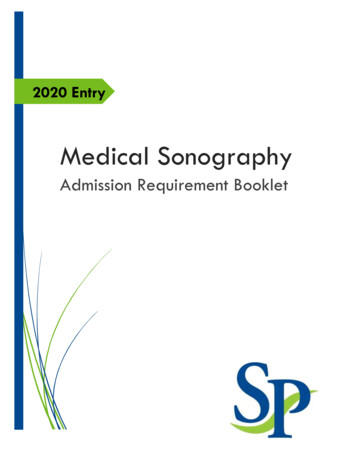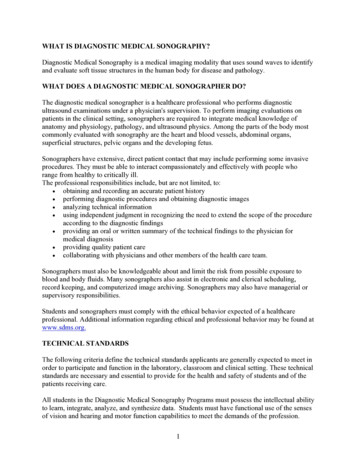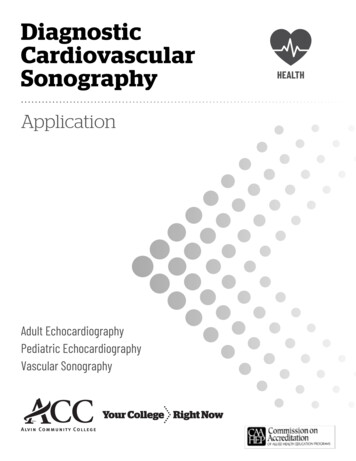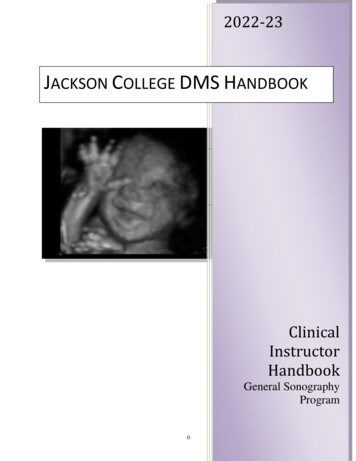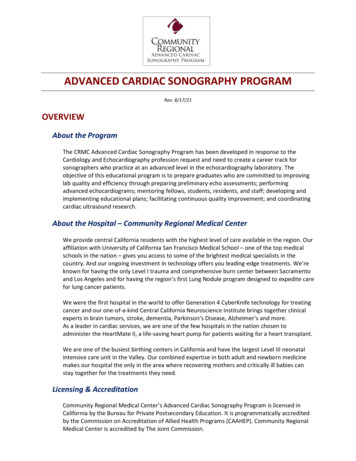
Transcription
ADVANCED CARDIAC SONOGRAPHY PROGRAMRev. 8/17/21OVERVIEWAbout the ProgramThe CRMC Advanced Cardiac Sonography Program has been developed in response to theCardiology and Echocardiography profession request and need to create a career track forsonographers who practice at an advanced level in the echocardiography laboratory. Theobjective of this educational program is to prepare graduates who are committed to improvinglab quality and efficiency through preparing preliminary echo assessments; performingadvanced echocardiograms; mentoring fellows, students, residents, and staff; developing andimplementing educational plans; facilitating continuous quality improvement; and coordinatingcardiac ultrasound research.About the Hospital – Community Regional Medical CenterWe provide central California residents with the highest level of care available in the region. Ouraffiliation with University of California San Francisco Medical School – one of the top medicalschools in the nation – gives you access to some of the brightest medical specialists in thecountry. And our ongoing investment in technology offers you leading-edge treatments. We’reknown for having the only Level I trauma and comprehensive burn center between Sacramentoand Los Angeles and for having the region’s first Lung Nodule program designed to expedite carefor lung cancer patients.We were the first hospital in the world to offer Generation 4 CyberKnife technology for treatingcancer and our one-of-a-kind Central California Neuroscience Institute brings together clinicalexperts in brain tumors, stroke, dementia, Parkinson’s Disease, Alzheimer’s and more.As a leader in cardiac services, we are one of the few hospitals in the nation chosen toadminister the HeartMate II, a life-saving heart pump for patients waiting for a heart transplant.We are one of the busiest birthing centers in California and have the largest Level III neonatalintensive care unit in the Valley. Our combined expertise in both adult and newborn medicinemakes our hospital the only in the area where recovering mothers and critically ill babies canstay together for the treatments they need.Licensing & AccreditationCommunity Regional Medical Center’s Advanced Cardiac Sonography Program is licensed inCalifornia by the Bureau for Private Postsecondary Education. It is programmatically accreditedby the Commission on Accreditation of Allied Health Programs (CAAHEP). Community RegionalMedical Center is accredited by The Joint Commission.
Program DesignThe hybrid program design will be utilized. The didactic component will be delivered online withminimal SKYPE instruction. Three weeks of the clinical internship (120 hours) will be completedat Community Regional Medical Center in Fresno, CA. The other 120 clinical internship hourswill be completed via distance learning (SKYPE instruction and assigned projects).FACULTYProgram Director/Principal InstructorJoy Guthrie, PhD., ACS, RDMS, RDCS, RVTAssistant Professor of Medicine, UCSF-FresnoEchocardiographyMedical Director/InstructorTeresa Daniele, MDAssistant Professor of Medicine, UCSFCardiologistAdministrative AssistantMichael ReinholdCURRICULUM STATEMENTThe overall design of the curriculum for the CRMC Advanced Cardiac Sonography Program willfollow the recommended curriculum document found in the Standards and Guidelines for theAdvanced Cardiovascular Sonography s and Guidelines for Advanced Cardiovascular Sonography.COURSE DESCRIPTIONSAdvanced Cardiac Hemodynamics and PathophysiologyCourse length: 5 weeksCourse Description: This course will provide an extensive review of Cardiac Hemodynamics,Physics, and Doppler principles. Advanced Physics, Instrumentation, and emphasis on flowrelated principles for image optimization will be reviewed. Cardiac hemodynamic instruction willinclude review of the cardiac cycle, ventricular function, autonomic nervous system, reflex andhumoral control of the circulation, vascular and coronary flow, valvular heart disease andexercise physiology.Physics and InstrumentationCourse length: 5 weeksCourse Description: This course will provide an extensive review of Ultrasound Physics andInstrumentation. Topic will include advanced hemodynamics, Doppler equation, spectralanalysis and color flow imaging, 3D (TTE and TEE), Harmonics, contrast agents, biological effects,image acquisition and storage, quality control, equipment selection, image optimization, andrecent advances in technology and ultrasound techniques.
Acquired Cardiovascular DiseaseCourse length: 5 weeksCourse Description: This course will provide and extensive review of acquired cardiovasculardisease including: Valvular heart disease, ischemic heart disease, prosthetic valve disease,pericardial disease, cardiac trauma, cardiac masses, radiation heart disease, and diseases of theaorta.Instructional TechniquesCourse length: 5 weeksCourse Description: This course is designed to prepare the learner to present case studies,power point lectures, and facilitate educational sessions at your place of employment. Thestudent will prepare a power point lecture to be presented at an educational session during theclinical internship. Adult learning strategies, empowerment of employees, and educationalintegration into the echocardiographic laboratory will also be covered. Situational learning willalso include scenarios related to department issues, i.e. disruptive behavior, noncompliance,protocol implementation, and quality assurance. Additional instruction in patient historicalassessment, physical exam with incorporation of hemodynamic information, and chart reviewwill be covered.IAC Accreditation PreparednessCourse length: 5 weeksCourse Description: This course is designed to either prepare for IAC accreditation or facilitatethe maintenance of an IAC accredited echocardiographic laboratory. The facility, staff, andphysician compliance will be covered as well as an extensive review of the IAC quality assuranceforms. The student will prepare for a mock quality assurance review and will present this duringone of the clinical internship visits.Clinical Trials and IRB MethodologyCourse length: 5 weeksCourse Description: This course is designed to prepare the learner for IRB submission,evaluating clinical trials related to the student’s topic of interest, and performing a literaturereview. CITI training will be completed and a sample IRB application will be completed. Topicswill include responsibilities and organization of research, clinical trial design, clinical trial studyprotocols, research clinical sites, statistical analysis, data handling and management, qualityassurance, regulatory consideration, IRB application process, sample size, and subjects training.Congenital Cardiovascular DiseaseCourse length: 5 weeksCourse Description: Extensive review of both normal anatomy and congenital heart disease willbe covered as noted by fetal echocardiography , pediatric echocardiography, and adultcongenital echocardiography. Maternal and fetal risk factors, indications for fetalechocardiography, and care from fetal through adulthood will be covered. Topics to be coveredinclude embryology, segmental intracardiac antomy, cardiac chambers and septation, valveanatomy and dynamics, coronary artery anatomy, conotruncal abnormalities, situsabnormalities, and mediastinal structures.Advanced Echocardiographic ModalitiesCourse length: 5 weeksCourse Description: This course will provide and extensive review of advancedechocardiographic modalities. Topics will include Contrast echocardiography, myocardialperfursion, contrast vascular applications, 3D and 4D imaging techniques, 3D quantification, 3Dvolume imaging, heart failure assessment, strain imaging, and cardiac resynchronization.
Comparative Imaging AnalysisCourse length: 5 weeksCourse Description: This course explores the strengths and weaknesses of echocardiographywith comparison to other imaging modalities such as x-ray, cardiac catherization, cardiac MRI,and cardiac nuclear medicine. This course will prepare the learner for the ancillary rotationsprovided during the clinical internship. Topics include coronary angiography and coronary arteryimaging, rest and exercise electrocardiography and echocardiography, nuclear cardiology, MRI,and overall role of complementary imaging modalities in various conditions including CAD,myocardial diseases, valvular heart disease, diseases of the aorta, and congenital heart disease.Medical / Surgical Treatment of Cardiovascular DiseaseCourse length: 5 weeksCourse Description: This course provides an extensive review of medical and surgical treatmentof cardiovascular disease. This course presents a knowledge based approach to student learning.Various disease processes will be assigned to each student. The students will research medicaljournals, clinical trials, and established methods to discover the latest and most clinicallyrelevant and accepted medical and /or surgical repair for the assigned topics. The student willpresent the results to the other students and faculty during the group clinical internship. Topicswill include prosthetic valves, balloon valvuloplasty, TEE for hemodynamic monitoring,transcatheter aortic valve implantation, mitral repair, closure of prosthetic paravalvular leaks,surgical options in cardiomyopathies, device closures, myocardial biopsies, and other relatedtopics.Cardiovascular PharmacologyCourse length: 5 weeksCourse Description: This course is a review of the most common pharmacologic agents utilizedin the treatment of cardiovascular disease. Topics will include antihypertensives, diuretics, ACEinhibitors, Angiotension Receptor blockers, Calcium channel blockers, Antiarrhythmics,antiplatelet/anticoagulants, chronotropic and Inotropic agents, nitrates, Local anesthetics,prostaglandin, and vasopressors. The didactic component will be accompanied by an onsitePharmacology instruction by one of our pharmacologistsResearch Methods and BiostatisticsCourse length: 5 weeksCourse Description: This course is an introduction to research methods and biostatistics. Thelearner will develop a research question, define the variables, write the code for the analysis,and define the methodology that will best answer the clinical question. Topics will includepopulation surveys, hypothesis testing, outcomes research, randomized vs. nonrandomizedmethods, blinded, double blinded and nonblinded, simulations, and multiple biostatisticalanalysis methods of testing variables.Image Critique and Analysis 1 (A-E)Course length: 25 week (two hours per week)Course Description: The focus of this course is to review a minimum of 250 echocardiographiccases with emphasis on protocol only. The student will apply a given protocol template to thereview of these cases as to whether the case, does or does not, adhere to the establishedprotocol. Image critique is of great importance to the advancement of the cardiac sonographer.This exercise will ensure the learner has a sharp recognition of protocol adherence. Thetemplate will be applied to the cases at the student’s respective place of employment and willbe ongoing. The image critique and analysis will be compared to the final interpretation by theinterpreting physician to quantify degree of accuracy. The student will log the hours and casesusing a de-identified methodology and will be reported to the faculty. The clinical competencywill be tested by the faculty during the onsite clinical internship.
Image Critique and Analysis 2 (A-E)Course length: 25 weeks (two hours per week)Course Description: The focus of this course is to review a minimum of 250 echocardiographiccases with emphasis on pathology recognition and reporting. The student will apply a givenreport template to the review of these cases as either normal or pathology using a systematicapproach. Pathology recognition and analysis is of great importance to the advancement of thecardiac sonographer. This exercise will ensure the learner has a sharp recognition of bothnormal and abnormal cases. The template will be applied to the cases at the student’srespective place of employment and will be ongoing. The image critique and analysis will becompared to the final interpretation by the interpreting physician to quantify degree ofaccuracy. The student will log the hours and cases using a de-identified methodology and willbe reported back to the faculty. The clinical competency will be tested by the faculty during theonsite clinical internship.Advanced Cardiac Sonographer Credentialing Exam Review (1-3)Course Length: 15 weeks (3 five week courses)Course Description: This course is designed to prepare the learner for the Advanced CardiacSonographer credentialing examination. This course will review the entire previous curriculumand provide a mock examination at the completion of the course. The entire ACS curriculum asoutlined in Standards and Guidelines document of the Advanced Cardiovascular Sonography(CAAHEP) will be reviewed prior to graduation.Clinical InternshipCourse length: 240 hoursCourse Description: Three required synchronous weeks with the entire class will be scheduledat Community Regional Medical Center. Week one is orientation and introduction to theprogram and skills needed to complete the respective online coursework. Week two will be atthe six month mark to allow for onsite instruction by the Medical Director and Program Director,required group presentations, advanced echocardiographic techniques, and onsite imagecritique and analysis education. The last week will be the final clinical competencies and finalproctored examination. The three remaining weeks are scheduled in an asynchronous fashionto be arranged between the individual student and the faculty. During these three weeks, thestudents will have assigned tasks with the sonography students, cardiac sonographers and theUCSF cardiac Fellows. In addition the student will complete ancillary rotations through nuclearmedicine, fetal echocardiography, NICU, adult congenital, and cardiac MRI.COSTTuition & FeesApplication FeeTuitionTOTAL TUITION AND FEES 50.00 8,000.00 8,050.00Additional ExpensesBooks*Materials*TOTAL ADDITIONAL EXPENSESTOTAL PROGRAM EXPENSE* 600.00 50.00 650.00 8,700.00
*Estimate – Price Subject to ChangeThese fees do not include travel and lodging fees which are the sole responsibility of the student.These fees will vary depending on the place of residence of each student. There are three weeks(Monday through Friday) required residencies during this program.PREREQUISITES Applicant must have a Bachelor’s Degree (Master’s preferred) (In any field of study)Applicant must be a credentialed sonographer in Adult Echocardiography (RDCS or RCS)Applicant must have a minimum of three years of clinical experience in an echocardiographylaboratoryIn ADDITION, the following courses MUST have been passed with a cumulative grade of 2.5or higher, with no individual grade lower than 2.0:o Anatomy (This course must include a lab.)o Physiology (This course must include a lab.)o Medical Terminologyo General Physics (This course does NOT need to include a lab.)o Math (Algebra or higher. Statistics will also suffice.)o English (This prerequisite may be met by a variety of courses including Grammar,Composition, etc.)o Communication Skills (This prerequisite may be met by a variety of courses includingSpeech, Group Discussion, etc.)Applicants must be able to complete the required onsite clinical internship of 120 hours(three weeks) in Fresno, CA.DATES & APPLICATIONSDates for the Next ACSP CohortThe next cohort will begin in January, 2022, and conclude in July, 2023.Applications and DeadlinesApplications for the next cohort are now available on our website. They must be submitted nolater than September 30, 2021.MORE INFORMATIONWebsite LinksTo access more information regarding the Community Regional Medical Center ADVANCEDCARDIAC SONOGRAPHY PROGRAM, return to our Home Page and refer to the various links atthe bottom of the graphy-ProgramsPhone & Email Call the ACSP office: (559) 459-2731Send an email message to: FresnoACSP@communitymedical.org
MailCommunity Regional Medical CenterTrauma Critical Care Building3rd Floor, Ultrasound Department2823 Fresno StreetFresno, California 93721
Standards and Guidelines for Advanced Cardiovascular Sonography. COURSE DESCRIPTIONS Advanced Cardiac Hemodynamics and Pathophysiology Course length: 5 weeks Course Description: This course will provide an extensive review of Cardiac Hemodynamics, Physics, and Doppler principles. Advanced Physics, Instrumentation, and emphasis on flow
